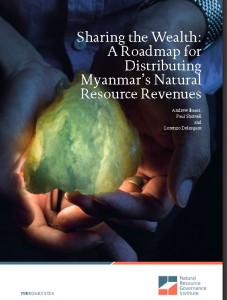Sharing the Wealth: A Roadmap for Distributing Myanmar’s Natural Resource Revenues
By Natural Resource Governance Institute • February 16, 2016 Oil, natural gas and mineral revenues are generated in nearly every state and region in Myanmar, with the most important onshore interests lying in Bago, Kachin, Magway, Mandalay, Sagaing, Shan and Tanintharyi. In these areas and others, extractive activities have significantly impacted livelihoods and the local environment. Populations in affected areas also assert a lack of direct benefits from the extractive industry.
Oil, natural gas and mineral revenues are generated in nearly every state and region in Myanmar, with the most important onshore interests lying in Bago, Kachin, Magway, Mandalay, Sagaing, Shan and Tanintharyi. In these areas and others, extractive activities have significantly impacted livelihoods and the local environment. Populations in affected areas also assert a lack of direct benefits from the extractive industry.
In response, the newly elected National League for Democracy (NLD) has committed to “work to ensure a fair distribution across the country of the profits from natural resource extraction, in accordance with the principles of a federal union.” Furthermore, regional and state leaders and several ethnic armed groups have pointed to natural resource revenue sharing as a key component in national reform, fiscal decentralization and peace processes. As such, distribution of natural resource revenues to subnational authorities will be a central component of any decentralization effort and could even feature in discussions around the creation of a new Myanmar federation.
Download the full report here.
Tags: ASEAN, Business and Human Rights, National League for Democracy, Natural Resource Governance Institute, Natural Resources, Peace ProcessThis post is in: ASEAN, Business and Human Rights, Displacement, Economy, Environmental and Economic Justice, Ethnic Nationalities, Health, Human Rights, International Relations, Law, Military Regime
Related PostsBurma Partnership Celebrates Continuing Regional Solidarity for Burma and Embraces the Work Ahead for Progressive Voice
Myanmar’s New Dawn :Opportunities for Aung San Suu Kyi and U.S.-Myanmar Relations
Expanding People’ Solidarity for a Just and Inclusive ASEAN Community
Civil society launches #FreeThe5KH campaign in support of the imprisoned ADHOC staff and NEC official
Myanmar logging ban a major step to forest sector reform









 All posts
All posts